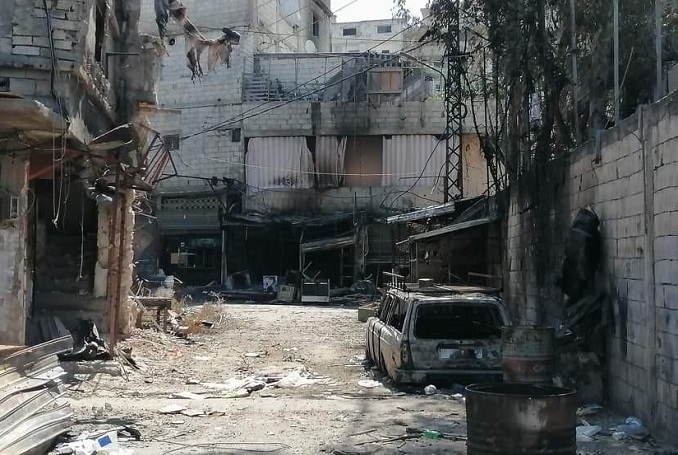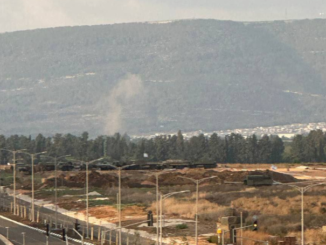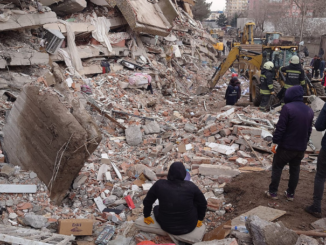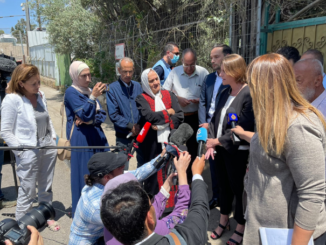
By Ramzy Baroud & Romana Rubeo
Starting on July 30, fighting erupted in Ain Al-Hilweh, one of the most crowded Palestinian refugee camps in South Lebanon. What is the bigger picture and why should Palestinians be talking about it?
Since the start of the fighting, at least 28 people have been killed and many others wounded.
How Did the Fighting Affect Life in the Camp?
The latest round of fighting, starting in late July, has forced thousands of Palestinian families to flee Ain Al-Hilweh, according to the United Nations Office for the Coordination of Humanitarian Affairs (OCHA).
Also, artillery shells have reached areas outside the camp, and several shells have fallen on Lebanese military positions, injuring several military personnel, according to the BBC.
Moreover, 6,000 Palestinian students are yet to return to school following the start of the new school year, according to the UN Palestinian Refugees Agency, UNRWA.
The latter is a direct outcome of the violence in the camp, but also due to the fact that fighters belonging to the feuding groups are using UNRWA schools and centers as their military bases.
So far, the economic losses in the camp have been estimated at 10 million dollars.
Who is Involved in the Fighting?
The clashes involve members of the leading PLO movement, Fatah, movement and a group called the “Muslim Youth”.
Despite repeated talks of a ceasefire, the fighting resumed on Wednesday.
According to Aljazeera Net, “the Fatah movement continues its efforts to (militarily) advance despite its inability to achieve a decisive military victory”.
For its part, the Muslim Youth is refusing to hand over those accused of killing Abu Ashraf Al-Armoushi, a general of the Palestinian National Security, last July.
On July 30, Al-Armoushi and a few others were killed in what is believed to be an ambush by Muslim Youth fighters.
The most recent confrontations erupted after a month-long ceasefire, which was reached in August under the auspices of the Palestinian Joint Action Authority, which is composed of representatives of major Palestinian political groups in South Lebanon.
Aljazeera Net reported that various heavy weapons and rocket-propelled grenades are being used in the camp, especially B-10 and 60-caliber mortars.
Hezbollah Leader Declares Stance on Ain Al-Hilweh Infighting
Who is Trying to Stop the Fighting?
Aside from the Palestinian Joint Action Authority, several Palestinian factions have called on those engaged in the clashes to immediately end the fighting and respect the ceasefire.
On August 1, soon after the first round of confrontations erupted, Hassan Nasrallah, the head of the Lebanese resistance group, Hezbollah, called for a halt to the deadly clashes.
“This fighting must not continue because its repercussions are bad – for the camp’s residents, for the dear Palestinian people … for the South, for all of Lebanon,” Nasrallah said in a televised address.
During a visit to the camp, Azzam Al-Ahmad, member of the Fatah Central Committee, said that “terrorist elements are exploiting the nature of the camp… and it is clear that they have contacts with foreign intelligence agencies (that are known) to us.”
Musa Abu Marzouq, Deputy Chief of Hamas’ Political Bureau Abroad, also visited the camp on Wednesday, September 13, “in an attempt to contain the situation in Ain Al-Hilweh and to reinforce the ceasefire that ended fierce clashes among the refugees,” according to a statement issued by the Hamas movement.
But in a joint statement by Hamas and the Islamic Jihad, cited in Aljazeera Net, the two leading Palestinian groups criticized those who are attempting to prolong the infighting.
The reference was linked to statements by Fatah that the fighting will continue until those responsible for the killing of Al-Armoushi, and others are apprehended.
Ain Al Hilweh: Hamas Top Official in Lebanon to Ensure Ceasefire Holds in Refugee Camp
What are the Independent Analysts Saying?
In an article published in August, respected Palestinian journalist Abdel Bari Atwan wrote that,
“What is happening in Ain al-Hilweh could well be an Israeli-sponsored attempt to cause inter-Palestinian strife by replicating the Jenin camp assault scenario in the camps in Lebanon, and delegating the task to the PA.”
“The higher purpose is to undermine security and stability in South Lebanon to divert the increasingly powerful Hezbollah from confronting the Israeli occupation forces it has been increasingly defying and harassing on the border,” Atwan continued.
“The PA turning its security forces’ attention to Lebanon crosses a red line replete with risks, not just for Lebanon but also the Palestinian cause.”
In a recent syndicated column, published as an editorial in the Palestine Chronicle, Ramzy Baroud wrote that “the Palestinian Authority of Mahmoud Abbas (..) wants to ensure Fatah loyalists dominate the camp, hence laboring to deny Palestinian rivals any role in South Lebanon.”
“Ain Al-Hilweh is important for the PA even though the PLO under Abbas’ leadership has largely disowned the refugees of South Lebanon and their Right of Return; it has focused mostly on governing specific regions in the West Bank under the auspices of the Israeli occupation.
“Yet, Lebanon’s refugees remain important for the PA for two main reasons: one, as a source of validation for Fatah and, two, to stave off any criticism of, let alone resistance to, the Western-backed Palestinian camp, in Lebanon and everywhere else.”
‘Capital of Shatat’ and Palestinian Agony: The Uncomfortable Truth about Ain Al-Hilweh
What is the Big Picture?
Some Paelstinians are rightly worried that the fighting in Ain Al-Hilweh is part of a larger political agenda aimed at disarmed Palestinian groups in the camp.
Fatah has for years attempted to assert its control over Ain Al-Hilweh as part of regaining political initiative, and bringing the camps under the umbrella of the PA in Ramallah.
Others suggest that if the fighting continues, pressure will be applied on the Lebanese army to regain control of the camp as it did in 2007 during the clashes in Nahr Al-Bared refugee camp, in northern Lebanon.
In May 2007, the camp became the theater of fighting between the Lebanese Army and members of Fatah Al-Islam. At least 10 people were killed, including three army soldiers.
During the infighting, which ended on September 2 of the same year, most inhabitants fled to the nearby Beddawi Palestinian refugee camp or to other cities in Lebanon. At the end, hundreds of people were killed from both sides, including many civilians.
The number of Palestinian refugees in Lebanon has been in constant decline due to the deteriorating economic, social and political conditions for hundreds of thousands of Palestinian refugees, mostly living in twelve refugee camps in Lebanon.
Those refugees once represented one of the main pillars of Palestinian resistance against Israel, and championed the discourse of the Right of Return – the Palestinian refugees right to go back to historic Palestine, as enshrined in United Nations Resolution 194.
Why Palestinians Should Talk about Ain Al-Hilweh
Simply hoping for the fighting to stop, blaming one side or another, or ignoring the subject altogether will not suffice.
If a fundamental change happens to the status of the refugee camp in terms of security or demographics, the impact could be dire for all Palestinian refugees in Lebanon.
Palestinians must mobilize and speak out against the various political designs to marginalize Palestinian refugees and their resistance in Lebanon.
They must do so through a greater understanding of the political context and the risks of allowing a specific political group to gain the upper hand above all others.
But most importantly, they should protest against the killing of Palestinians and other innocent people in Lebanon, while demanding greater Palestinian social and economic rights in Lebanon as a whole.
– Dr. Ramzy Baroud is a journalist, author and the Editor of The Palestine Chronicle. He is the author of six books. His latest book, co-edited with Ilan Pappé, is ‘Our Vision for Liberation: Engaged Palestinian Leaders and Intellectuals Speak Out’. His other books include ‘My Father was a Freedom Fighter’ and ‘The Last Earth’. Baroud is a Non-resident Senior Research Fellow at the Center for Islam and Global Affairs (CIGA). His website is www.ramzybaroud.net
– Romana Rubeo is an Italian writer and the managing editor of The Palestine Chronicle. Her articles appeared in many online newspapers and academic journals. She holds a Master’s Degree in Foreign Languages and Literature and specializes in audio-visual and journalism translation.







